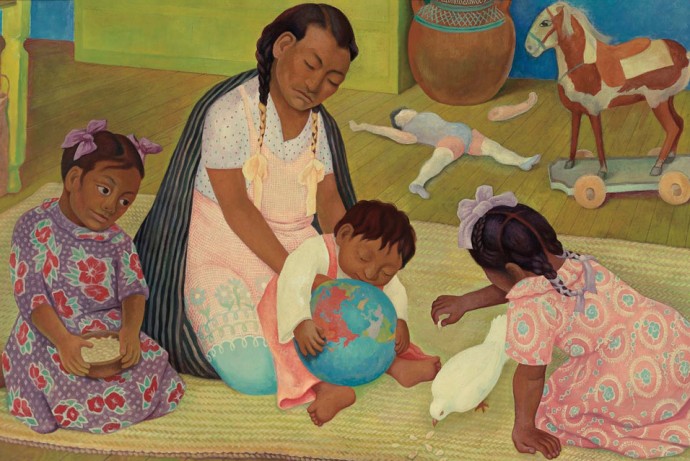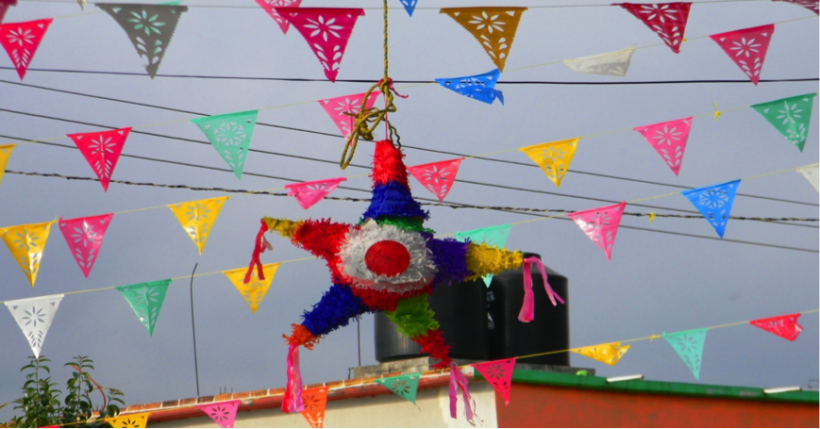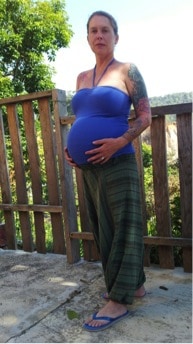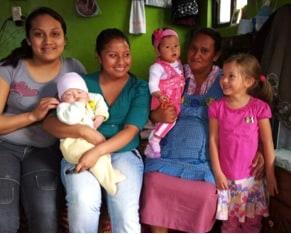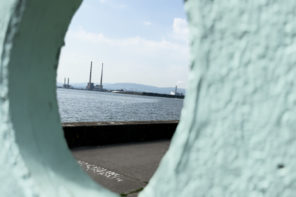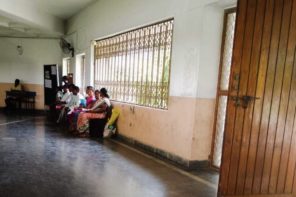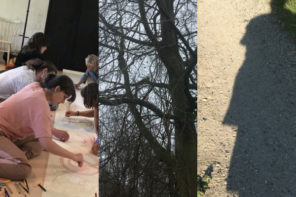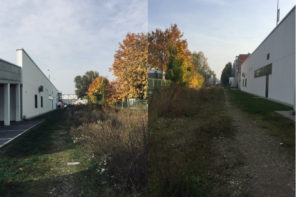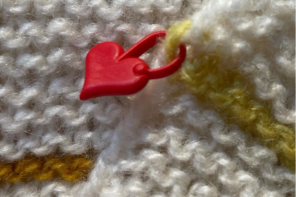I’ve never been one for doing things the easy way, but then again life has never offered me the easy route to anything. My postgraduate studies have clashed with a) my most reproductive years and b) a time when my family has needed to move countries in order to build a secure future for us. Part of that secure future is obtaining my PhD and that means like many other post graduates, working, studying and bringing up a young family all at once in the vain hope that I’ll get there one day. It also means patience and sacrifice from those around me in order to make it all possible. In 2012-2013 I needed to complete long-term fieldwork (adding to previous shorter stints), I couldn’t afford to lose my day job (I am self-funded and the principle earner in the household) or our UK home and I had to accommodate my husband, two children and gestating foetus in the process. If I could convince my family (and myself!) that brief separation would not damage our unit then the possibility of pregnancy, birth, fieldwork and childcare across two countries could be achieved. It had to work, I had no other choice – anthropology is my passion and so is my family.
The following paragraphs are comprised of excerpts from the online reflective blog I kept whilst completing eight months of data collection in Chiapas, Mexico (in 2013). I used it as a space to think about motherhood in the field as an auto-ethnographic project that wouldn’t compromise my research and participants. It was an open-thinking forum that allowed ongoing peer feedback and reflection on my methodology. My reflective blogging from 2013 fell into three specific stages 1) separation, arrival and pregnancy 2) birth and reuniting, and 3) post birth and re-separation, all of which affected my outlook in the field and often guided my focus and kept me grounded. Following on from the excerpts will be a brief summary of what I learnt from my experience of motherhood in the field.
Separation, Arrival and Pregnancy
On the morning I said goodbye to my husband and three year old son at the airport I had a horrific sinking feeling that I was about to risk our family wellbeing for my own selfish ambition. That fear was made more intense by the fact that I had started the ball rolling, made the financial commitments and put forward my case to family and friends – in short: backing out was not an option. If ever I needed an incentive to make things happen this was it.
Things were up and down for the first few weeks:
Coming up to about a month last night I heard the words I have been dreading “Mummy I don’t want to be here any more, I want to go home”. If anything I’m surprised it took this long, though my eldest has always been sensitive to what’s going on around her and is not likely to blurt this out at any given moment. I have to say I envy a child’s ability to be honest with themselves and those surrounding them, in reality she was only echoing what I have often felt on the inside during this first month.
So far we have had arguments with landlords and house moves, infestations of head lice, regretful, unplanned trips to the jungle (long story!), occasional vomiting, over tiredness, insomnia and a spattering of general wobbling of confidence in what I’m here to achieve – and that’s just me! Having been witness to all this and only once having uttered the ‘going home’ words, (which to add context were said as an over-tired, outplayed four year old was refusing to put her own pyjamas on) before promptly falling fast asleep, has actually left me feeling immensely proud of eldest daughter and amazed at her adaptation skills. After spending a sleepless night worrying about my response/plan to these dreaded words, there was no mention of it the next morning as she happily chatted on about her plans for play that day. She appears to be coping with this whole fieldwork thing much better than me!
Pregnancy and childcare started to shape my fieldwork strategy from the beginning:
A positive house move to a neighbourhood where other children are at hand to play with and impending starting of pre-school have certainly helped smooth over this initial period. A better place to live and heavy belly has left me reluctant to travel to the capital to collect my comparative data, but surprisingly I reckon I can find everything I need right here! From my workload point of view it also allows me to stop pressurising myself into intense data collection as I will very soon have a short period of 5 child free hours a day to occupy myself with and a more defined ‘work day’. I’ve never been an outspoken fan of routine, however, bringing a child into the field has forced me to have a structured routine that is beneficial to data collection.
Birth and Reuniting
Three months into fieldwork I gave birth to my third child, my husband and son joined us for two months and this distraction proved both a blessing and a hindrance to my work:
We are now a family group of 5 in the field site, I am two weeks postpartum and myself and new baby have not left the house since the birth. She is 100% healthy, feeds and sleeps well and therefore leaves me with time to reflect (and worry) about my work and period in the field, especially when the school run is taking place and everyone else is out of the house for a few hours. One could almost say I have too much time to think, or in fact that I just think too much! …I became so engrossed in my data collection during those first couple of months partly because it was going so well since our move to this house and partly because I was worried about not functioning well postpartum and everything generally going a bit wobbly. I also looked forward to taking a month off and being absorbed by family. Needless to say this has not happened. I had a very quick and simple (and exhilarating) birth leaving me physically in excellent condition and really I should know myself better by now! The truth is I can’t switch off completely no matter how hard I try, so I figure it is better not to try. Instead I’m worrying about the data I’m missing out on whilst in the house and the practicalities of what need to be achieved whilst I have some help around and also afterwards.
Post-birth and re-separation
There arrived the day when my extra support system left and I returned to the position of being a temporary lone parent with a five year old and newborn. Yet again this afforded me a new perspective on what I was doing. It was undoubtedly the most difficult period and one which ultimately led to the decision of returning home a month earlier than planned:
We have gone from a house of two to five in a matter of days and a family separation once again. This could have been a disaster, turning everything upside down just as my data collection was gaining pace and my informant relationships developing. It was in fact the opposite … it changed the way I look at my research questions and gave me a completely different perspective on maternal subjectivities. It also reminded me of a crucial aspect I had up to this point been ignoring – the paternal perspective on motherhood and child rearing. An obvious yet easily lost perspective in a fieldsite with highly gendered spaces. Having my husband here, himself once a local boy increased my limited opportunity to be reminded of how people here shape fatherhood and men’s role in child rearing and decision making, his conversations with local men have been enlightening. Saying goodbye a second time around has been horrible and unsettling for us all, it really made me reassess my priorities – PhD or Family – it felt like a battle between the two. I realise now that it is not so clear cut and there are ways to make them of equal importance in a practical sense. It might seem strange to put my academic and career development on a par with my family but no-one quite prepares you for the emotional and physical strain of…well….either one and in that sense they are very similar. Being a mother and a wife influences who I am as a human being, but so does my study. This experience is teaching me a lot about myself and the strength of my relationships and in turn is giving me an insight into the lives I study that would never have happened if my own family life hadn’t been turned upside down in order to make it happen.
Almost a year later I’m well into my write up and trawling through my field notes, photos, recordings and collection artefacts on a daily basis is a constant reminder of what my family did during 2013. I find it difficult to imagine how my fieldwork would have gone if I had been alone for the duration. I am aware that my topic area of maternal subjectivity is benefitted by my positioning as a mother, in terms of gaining access to the lives of women and their families and moreover their eventual trust, the presence of my own family was priceless. But the limits placed on my time, travelling and energy by having to care for young children meant that some days I missed out on some great opportunities that I will never have the chance to take again.
Ultimately I learnt a lot about my own culture’s attitudes to child rearing and working mothers. I often floated suggestions and questions on social media asking for advice or comments from academics and students who are also parents. A consensus amongst many was the idea that fieldwork could/should be done for short periods and that finding a time to parent would be difficult. This did make me reflect on the perspective of my children and how appropriate it was to bring them into the field, but this was constantly outweighed by the acceptance of my chosen discipline of anthropology and desire to complete an in depth ethnography of my subject in question. When I was considering the viability of having to cut short my fieldtrip a UK colleague commented that it was the right thing to do as I had compromised my family enough already. I couldn’t help wondering if they would be saying the same to a male colleague working away – I decided not to ask, though it left me with some thinking to do.
My children always give me the balance. They talk of how much they loved the school and friends they met, how much they enjoyed seeing their cousins and grandma. They ask a lot about when we are going back, though always together as a family. They don’t want us to separate again for any length of time but they think it’s cool they can be involved in mummy’s work. Academia needs to make space for working families and understand the long term benefits of supporting working/studying parents to get ahead. More women are working, more are studying at PG level and more are waiting until their mid 30’s to begin parenting – this needs to be taken into account rather than being challenged as unworkable. I like to think that anthropology is the discipline to forge ahead with this new way of thinking, our insight into cultural variations of parenting and attitudes to work and education give us an advantage over others to see how things can be done if you’re open minded enough to think outside the box and challenge expectations.
Read Reetta Toivanen’s earlier post on fieldwork with children here.

